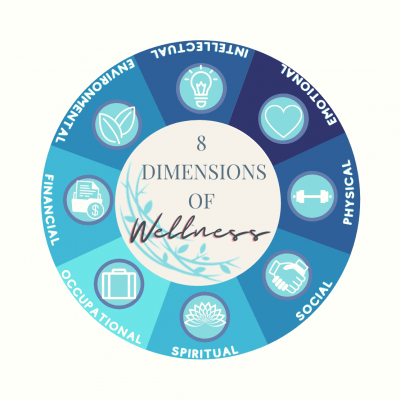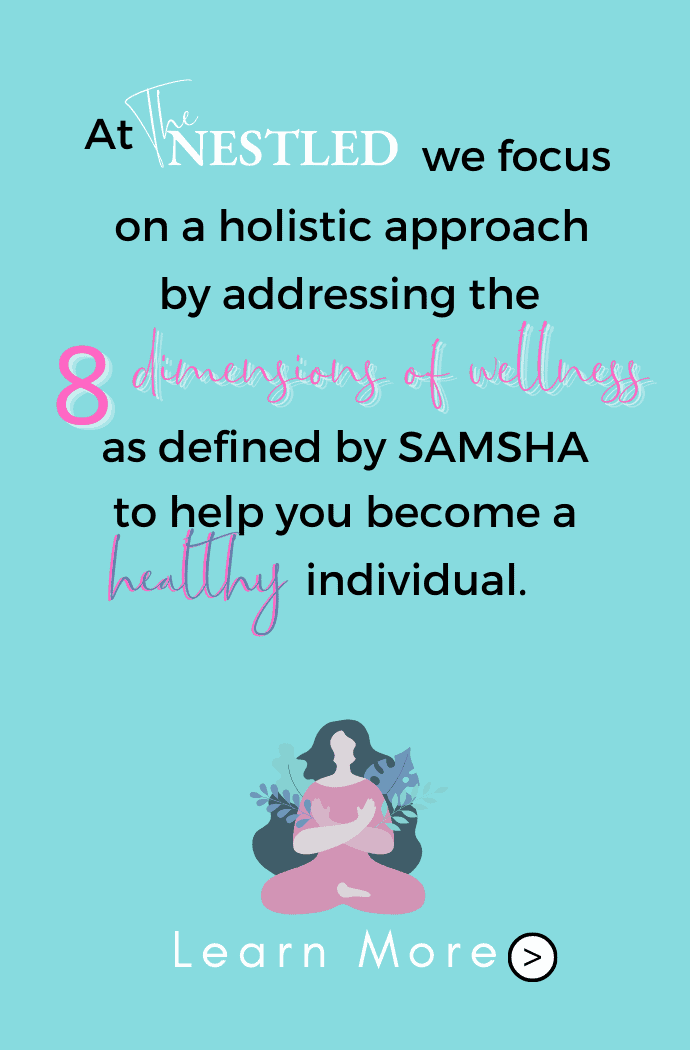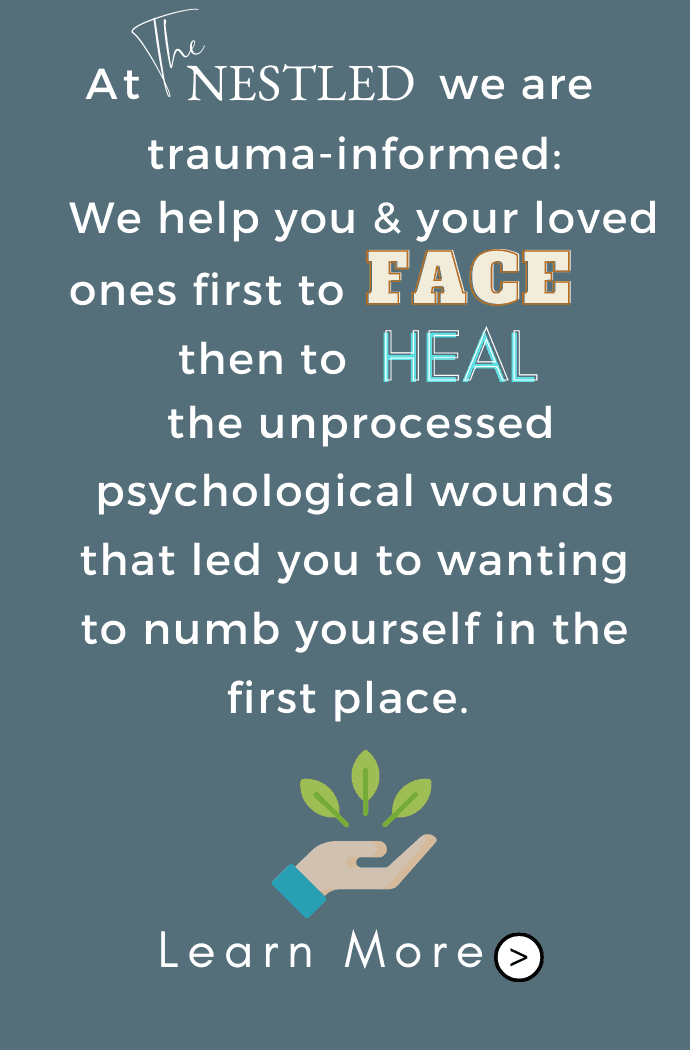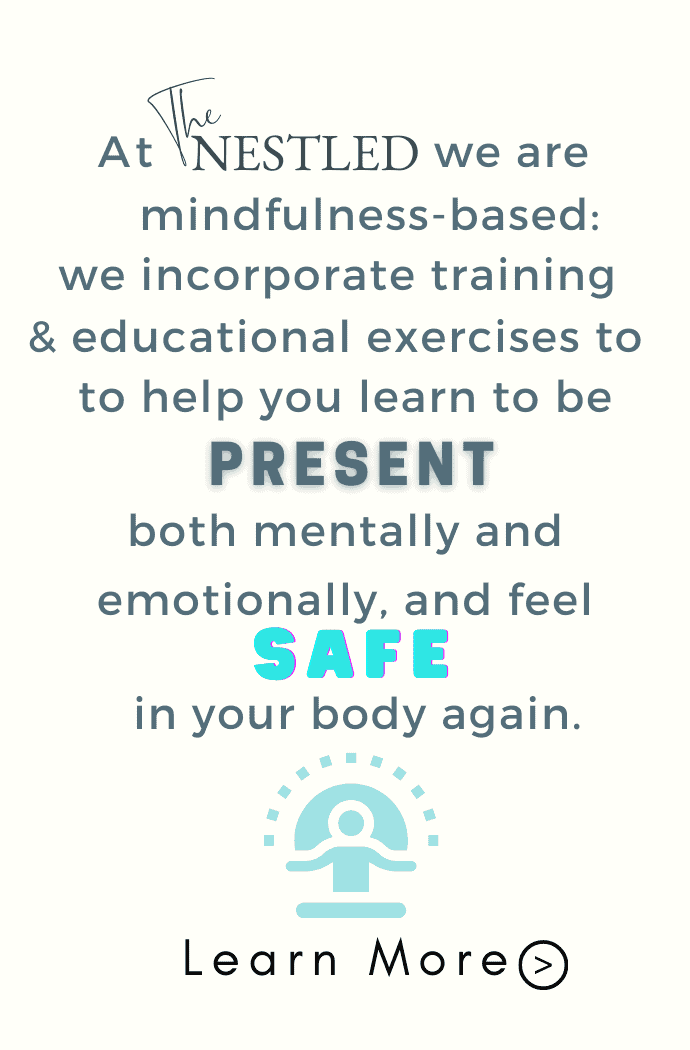A holistic approach to addiction treats the whole person: body, mind, and spirit. By definition, an addiction to drugs and alcohol creates a chemical dependency within a person’s body, causing them to crave more of the substance. Holistic treatment for substance abuse begins with medical detox to break that chemical dependence and then looks beneath the surface to figure out what caused the addiction in the first place.
Our holistic treatment approach takes this one step further, addressing the mind, body, and spirit using the framework of the 8 dimensions of wellness in all of our programs. The 8 dimensions of wellness are: Physical, Spiritual, Mental, Emotional, Social, Occupational, Financial, and Environmental. Each dimension is crucial to an individual’s well-being and must be professionally assessed and recalibrated to facilitate healing. We also utilize trauma-informed care to reach the root of one’s issues. When a person is healed from trauma, they are likely to recover successfully.
We believe that treating the whole person requires an integrated approach, which is why we offer individualized treatment plans that utilize a combination of alternative therapies and psychotherapies such as cognitive-behavioral therapy.
Every Minute Of Early Recovery Matters. Treating The Entire Person And Not Just Symptoms Can Lead To Lasting Sobriety
Different Types Of Holistic Therapies For Substance Use Disorder
Holistic addiction treatment is an approach that recognizes the interconnectedness of the body, mind, and spirit, and aims to address the root causes of addiction by treating the whole person rather than just their symptoms. It recognizes that addiction is not just a physical problem but also a psychological, emotional, and spiritual one, and that a comprehensive treatment plan should consider all of these aspects. There are many different holistic therapies Including:
- Behavioral therapy: This type of therapy aims to change negative thought patterns and behaviors that contribute to addiction. Cognitive-behavioral therapy (CBT) and dialectical behavior therapy (DBT) are two common types of behavioral therapy used in addiction treatment.
- Individual and group counseling: Counseling sessions provide a safe and supportive environment for individuals to discuss their feelings, emotions, and concerns related to addiction. This can help individuals develop coping strategies and learn how to manage triggers and cravings.
- Mindfulness and meditation: These practices help individuals develop a greater awareness of their thoughts and emotions, which can reduce stress and anxiety and improve overall well-being. Mindfulness-based stress reduction (MBSR) and mindfulness-based cognitive therapy (MBCT) are two popular types of mindfulness-based therapies used in addiction treatment.
- Nutritional counseling: Good nutrition is essential for physical and mental health. Nutritional counseling can help individuals develop healthy eating habits and address any deficiencies or imbalances that may contribute to addiction.
- Exercise and physical activity: Regular exercise and physical activity can improve physical health, reduce stress and anxiety, and boost mood and self-esteem.
- Alternative therapies: Acupuncture, massage, art therapy, equine therapy, yoga therapy, and sound healing groups are examples of alternative therapies that can help individuals manage stress, reduce anxiety, and improve overall well-being.
- Group therapy: Group therapy provides a supportive and non-judgmental environment for individuals to share their experiences and learn from others who are going through similar struggles. Group therapy can be particularly effective for individuals who struggle with social isolation or lack a supportive network of friends and family.
Holistic therapy looks beneath the surface, using several approaches to find and address the root cause of a substance use disorder, which tends to be complex and is not always obvious during addiction treatment. Holistic therapy also empowers the individual by teaching them a variety of mindfulness tools and techniques that can help them self-regulate and bring them back into the present moment. Attending a rehab program is the first step to overcoming the addiction but learning holistic techniques can benefit individuals for a lifetime after detox.
Why Is Holistic Addiction Treatment Useful?
Holistic therapies are important because not everyone responds well to a traditional treatment approach, which simply addresses the surface-level symptoms of an addiction to alcohol and drugs. Using a number of therapies, a holistic approach helps a person get in touch with their body which empowers them to explore and understand the connection between their struggle with addiction and their emotional, physical, and spiritual needs.
A holistic approach also promotes long-term wellness by giving people tools that they can continue to use once they complete a recovery program. These tools may include breathing techniques, meditation, and yoga practices, as well as lifestyle changes such as getting proper nutrition and consistent physical exercise.
Recovery from addiction, a chronic, relapse-prone disorder (Leshner, 1997), is a lifelong dynamic process. Addressing the underlying causes, symptoms, triggers to relapse, co-occurring mental health disorders and behavioral patterns is important to achieve lasting success.
What Are The Factors That Lead To Successful Drug And Alcohol Abstinence?
There are many different ways to stop using drugs and alcohol. According to the National Library Of Medicine, formal treatment and informal treatment like the 12 steps can be effective but addressing different psychosocial factors to achieve positive outcomes. Some of the factors include:
- “losing something” like a home, job, wife or children can be a motivating factor
- Social support from friends and family
- friends accepting substance use
- Participation in peer recovery groups like the 12 steps after a treatment episode
- Addressing underlying trauma
- Cognitive therapy and education
Related Articles:
Holistic Approach Vs Medical Approach To Drug and Alcohol Rehab
Substance use can be a means of distracting from uncomfortable feelings and maintaining relationships, but it often leads to deteriorating physical and mental well-being. In active addiction, chemical intake becomes prioritized over the need for emotional processing or looking after one’s body – this combination more likely results in broken interpersonal connections and health setbacks as opposed to the resolution.
It’s important to address the underlying causes of addiction while also remaining medically safe during detox. A multi-medical approach to recovery that combines holistic therapies can be extremely helpful in overcoming obstacles as they arise during recovery from drug and alcohol abuse.
Holistic addiction treatment recognizes that addiction is a chronic disease that requires ongoing support and care. Therefore, aftercare services are an essential component of the treatment plan. Aftercare services may include support groups, individual counseling, and continued participation in therapy or other complementary therapies.
Start Holistic Addiction Treatment At The Nestled Recovery In Las Vegas, Nevada
There are many rehab centers in Las Vegas, and it can feel overwhelming to know which one is right for you. If you are drawn to a holistic treatment model for drug rehab, consider which kind of program is best suited to your needs. Our treatment center is an oasis for addiction recovery, offering a compassionate, holistic treatment approach in our beautiful state-of-the-art facility. Now is always the best time to make an important life change, and we understand how much courage it takes to decide to reach out for help. If you or a loved one is struggling with addiction, contact us today.
At Nestled Recovery, we offer a holistic addiction treatment in a luxury drug and alcohol rehab center based in Las Vegas, Nevada. We believe that a holistic addiction treatment is more important than ever for long-term recovery which is why we utilize a variety of psychotherapies and experiential therapies in all of our programs. Our signature 30-day program is limited to a maximum of 10 residents at all times, allowing us to offer individualized, compassionate care in a safe and comfortable environment.








